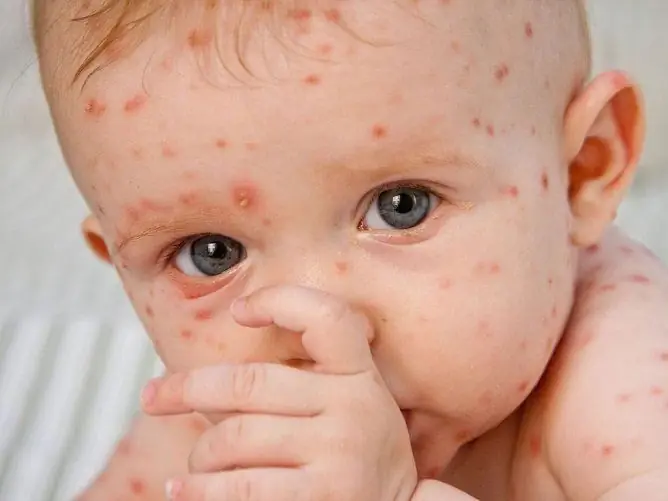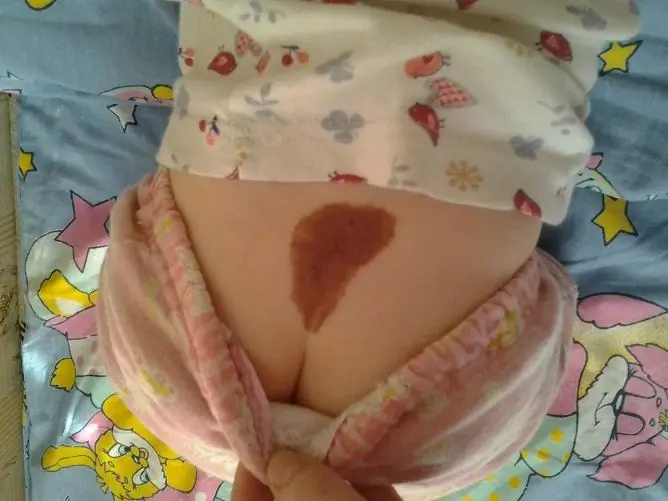- Author Rachel Wainwright [email protected].
- Public 2023-12-15 07:39.
- Last modified 2025-11-02 20:14.
The child sweats during sleep: reasons, recommendations
The content of the article:
-
The main causes of increased sweating
- Overwork and excitement
- Colds
- Genetic predisposition
- Hereditary diseases
- Nervous system disorders
- Rickets
- General recommendations
- When to see a doctor
- Video
If a child sweats during sleep, then there can be many reasons, but most often they are insignificant and do not require special treatment.

Most often, night sweats in children have physiological causes.
The autonomic nervous system is responsible for the work of the sweat glands, which also regulates blood circulation, digestion, etc. In young children, it is very poorly developed, so sweating is often a consequence of this particular age feature.
Sweat glands in a newborn are also not fully formed, they begin to work actively from 3-4 weeks of life. Their full development is observed at the age of 4-5 years. Therefore, it is normal for the baby to react to the ambient temperature by sweating.
The main causes of increased sweating
Why does the child sweat, and what should be done while doing this? These questions are most often asked by parents who are concerned about the symptoms of hyperhidrosis.
According to the famous pediatrician E. Komarovsky, in most cases, excessive sweating is a variant of the norm, and there is no reason to worry about the state of health.
Overwork and excitement
Kids in most cases react very emotionally to any events in their lives. Both negative and positive emotions can lead to the fact that their head and neck begin to sweat during sleep. Severe fatigue can also lead to this.

Before bed, preference should be given to calm games that do not evoke strong emotions.
In order to avoid sweating, it is necessary to give up outdoor games before bedtime, it is advisable to exclude strong feelings. You also need to adjust the daily routine so that the baby goes to bed at the same time.
Colds
During colds, the amount of sweat secreted increases significantly. This makes it possible to lower body temperature in case of fever and helps to remove toxins from the body.
In order for sweating to normalize after an illness, some time must pass. During this period, the child will continue to sweat during sleep, which should not scare the parents. This condition does not require specific treatment; after a few days, the problem will disappear by itself.
Genetic predisposition
If a close relative of the baby suffers from hyperhidrosis, then, perhaps, the pathology was inherited. At the same time, hyper-perspiration is observed in the absence of certain diseases, which may be accompanied by increased activity of the sweat glands.
This feature of the body is associated with various factors that affect the excitability of the sympathetic nervous system, namely:
- high sensitivity of the body to the hormones norepinephrine and adrenaline;
- high levels of sex or thyroid hormones;
- excess of serotonin mediator.
To get rid of hyperhidrosis in this case is almost impossible. But with age, its manifestations may decrease.
Hereditary diseases
Hereditary diseases are another reason a child sweats a lot at night. With such pathologies, not only damage to the sweat glands can occur, but also the work of other organs secreting secrets can be disrupted.

In some cases, excessive sweating is a consequence of hereditary diseases
Of all hereditary diseases, cystic fibrosis is the most commonly diagnosed. This changes not only the amount of sweat, but also its composition. The sweat glands secrete large amounts of chlorine and sodium (small salt crystals can be seen on the skin).
Also, a hereditary disease such as phenylketonuria can be the reason that a child sweats a lot during sleep. Its signs are observed from the first days of a baby's life: too pale skin, light eyes, absent look. The maximum amount of sweat is secreted at night, and the skin acquires a characteristic "mouse" odor.
In this case, not everyone succeeds in getting rid of sweating, and only after long and serious treatment. It is necessary to pay special attention to the personal hygiene of the baby and follow all the doctor's recommendations.
Nervous system disorders
Another alarming reason that a baby sweats a lot during sleep can be disturbances in the nervous system due to difficult childbirth, trauma, or infectious diseases.
It is necessary to seek the advice of a neurologist if symptoms such as:
| Symptoms | Description |
| Heavy sweating | Its severity does not depend on external factors. |
| Change in perspiration consistency | It becomes too viscous or liquid |
| Change in sweat odor | Both the smell itself and its severity can change |
| Sweating of unpaired body parts or specific areas | It can be one hand or one foot |
Rickets
The first signs of the disease appear in infants at 1-2 months. Children who were born in autumn or winter, when there is not enough sunlight, suffer more often. The reason for this pathology is a reduced amount of vitamin D in the body, which is formed in the skin under the influence of sunlight.

To avoid the development of rickets, it is important to organize a proper diet that includes a sufficient amount of vitamin D
The following symptoms may indicate rickets in infants:
- increased sweating at night, usually the scalp and face sweat most strongly. In this case, sweat acquires a sour smell;
- the presence of symptoms not only at night, but also during the day, when the baby is pushing or eating;
- disorders of the digestive system, the appearance of frequent constipation;
- severe skin irritation in areas of excessive sweating; sweat irritates the baby's skin, and he begins to rub his head against the pillow, as a result of which he develops baldness in the back of the head;
- general disorders: the baby becomes restless, sleeps poorly and shudders at loud sounds.
General recommendations
Since the baby is actively moving during the day, sweat quickly evaporates from the surface of the skin. During sleep, the usual amount of sweat is released, and it does not disappear so quickly.

It is necessary to maintain the optimal temperature and humidity in the baby's room.
Most parents, trying to protect their baby from the cold, lose their sense of proportion. Excessive care (warm pajamas, duvet and heater on) increases the likelihood of increased sweating.
Following the advice of Dr. Komarovsky, it is necessary to create comfortable conditions. The temperature in the bedroom should not exceed 20 ° C, and it does not matter if this is the room of a newborn, a toddler at 2 years old, or a child who is over 3 years old. You should also pay attention to the air humidity, it should be 50-60%. The room needs to be ventilated before going to bed.
In order to reduce sweating, you can use chamomile and series baths. To do this, plant raw materials are mixed in the same proportion and poured with boiling water. After the product is infused for an hour, it is filtered and poured into a bathing bath. The procedure is performed once a day before bedtime.
When to see a doctor
Medical consultation is indicated in the following cases:
- the appearance of increased sweating in a child over one year old in the absence of obvious reasons (emotional stress, infectious diseases, etc.);
- the occurrence of additional symptoms such as weakness, lethargy, drowsiness, lack of appetite.
Video
We offer for viewing a video on the topic of the article.

Anna Kozlova Medical journalist About the author
Education: Rostov State Medical University, specialty "General Medicine".
Found a mistake in the text? Select it and press Ctrl + Enter.






